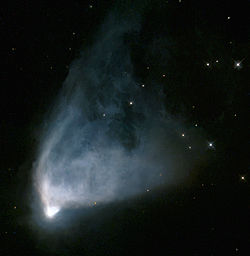R Monocerotis, abbreviated R Mon, is a very young binary star[5] system in the equatorial constellation of Monoceros. The apparent magnitude of R Mon varies between 10 and 12 and the spectral type is B8IIIe.[3]
| Observation data Epoch J2000 Equinox J2000 | |
|---|---|
| Constellation | Monoceros |
| Right ascension | 06h 39m 09.954s[1] |
| Declination | +08° 44′ 09.56″[1] |
| Apparent magnitude (V) | 11.85[2] |
| Characteristics | |
| Spectral type | B8IIIev[3] |
| Variable type | T Tauri[2] |
| Astrometry | |
| Distance | 2600 ly (800[4] pc) |
| Details | |
| Mass | ~2–10[5] M☉ |
| Age | ~105 yr[5] years |
| Other designations | |
| Database references | |
| SIMBAD | data |

This is a massive Herbig Ae/Be star, a type of pre-main-sequence star that is surrounded by an orbiting circumstellar disk of gas and dust. This disk has a mass of ~0.007 M☉ and extends outward to a distance of under 150 AU from the host. Because of this dust, the star is obscured from direct visual sight but can still be observed in the infrared.[5] R Mon is still in the accretion phase of star formation and it is driving an optically opaque bipolar outflow with a velocity of 9 km/s. The northern flow is blue-shifted, and thus moving more toward the Sun.[7] There is a T Tauri-type stellar companion at an angular separation of 0.69″ from the primary.[5]
This system is located in a diffuse nebula called "Hubble's Variable Nebula" (NGC 2261), which is being illuminated by a conical beam of light from the primary.[5]
References
Further reading
- Murakawa, K.; et al. (September 2008). "VLT/NACO and Subaru/CIAO JHK-band high-resolution imaging polarimetry of the Herbig Be star R Monocerotis". Astronomy and Astrophysics. 488 (3): L75–L78. Bibcode:2008A&A...488L..75M. doi:10.1051/0004-6361:200810462.
